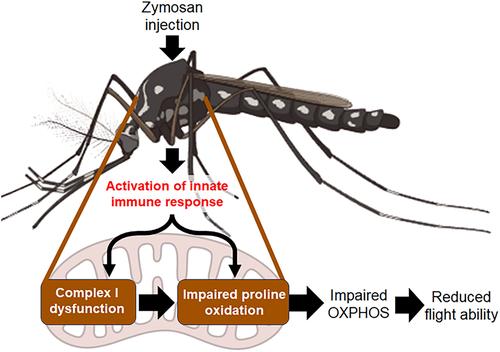当前位置:
X-MOL 学术
›
Mol. Microbiol.
›
论文详情
Our official English website, www.x-mol.net, welcomes your feedback! (Note: you will need to create a separate account there.)
Activation of innate immunity selectively compromises mitochondrial complex I, proline oxidation, and flight activity in the major arbovirus vector Aedes aegypti
Molecular Microbiology ( IF 3.6 ) Pub Date : 2024-05-09 , DOI: 10.1111/mmi.15269 Alessandro Gaviraghi 1, 2 , Ana Beatriz F. Barletta 2, 3 , Thiago Luiz Alves E. Silva 2, 3 , Matheus P. Oliveira 1, 2 , Marcos H. F. Sorgine 2, 3 , Marcus F. Oliveira 1, 3
Aedes aegypti females are natural vectors of important arboviruses such as dengue, zika, and yellow fever. Mosquitoes activate innate immune response signaling pathways upon infection, as a resistance mechanism to fight pathogens and limit their propagation. Despite the beneficial effects of immune activation for insect vectors, phenotypic costs ultimately affect their fitness. However, the underlying mechanisms that mediate these fitness costs remain poorly understood. Given the high energy required to mount a proper immune response, we hypothesized that systemic activation of innate immunity would impair flight muscle mitochondrial function, compromising tissue energy demand and flight activity. Here, we investigated the dynamic effects of activation of innate immunity by intra‐thoracic zymosan injection on A. aegypti flight muscle mitochondrial metabolism. Zymosan injection significantly increased defensin A expression in fat bodies in a time‐dependent manner that compromised flight activity. Although oxidant levels in flight muscle were hardly altered, ATP‐linked respiratory rates driven by mitochondrial pyruvate+proline oxidation were significantly reduced at 24 h upon zymosan injection. Oxidative phosphorylation coupling was preserved regardless of innate immune response activation along 24 h. Importantly, rotenone‐sensitive respiration and complex I‐III activity were specifically reduced 24 h upon zymosan injection. Also, loss of complex I activity compromised ATP‐linked and maximal respiratory rates mediated by mitochondrial proline oxidation. Finally, the magnitude of innate immune response activation negatively correlated with respiratory rates, regardless of the metabolic states. Collectively, we demonstrate that activation of innate immunity is strongly associated with reduced flight muscle complex I activity with direct consequences to mitochondrial proline oxidation and flight activity. Remarkably, our results indicate a trade‐off between dispersal and immunity exists in an insect vector, underscoring the potential consequences of disrupted flight muscle mitochondrial energy metabolism to arbovirus transmission.
中文翻译:

先天免疫的激活选择性地损害主要虫媒病毒载体埃及伊蚊的线粒体复合物 I、脯氨酸氧化和飞行活性
埃及伊蚊 女性是登革热、寨卡病毒和黄热病等重要虫媒病毒的天然载体。蚊子在感染后会激活先天免疫反应信号通路,作为对抗病原体并限制其传播的抵抗机制。尽管免疫激活对昆虫媒介有有益的影响,但表型成本最终会影响它们的适应性。然而,调节这些适应度成本的潜在机制仍然知之甚少。鉴于产生适当的免疫反应所需的高能量,我们假设先天免疫的系统激活会损害飞行肌线粒体功能,从而损害组织能量需求和飞行活动。在这里,我们研究了胸腔内注射酵母聚糖激活先天免疫的动态影响埃及伊蚊 飞行肌线粒体代谢。注射酵母聚糖以时间依赖性方式显着增加脂肪体中防御素 A 的表达,从而损害飞行活动。尽管飞行肌中的氧化剂水平几乎没有改变,但注射酵母聚糖后 24 小时,由线粒体丙酮酸+脯氨酸氧化驱动的 ATP 相关呼吸速率显着降低。无论先天免疫反应在 24 小时内是否激活,氧化磷酸化偶联均得以保留。重要的是,注射酵母聚糖后 24 小时,鱼藤酮敏感的呼吸和复合物 I-III 活性明显降低。此外,复合物 I 活性的丧失会损害由线粒体脯氨酸氧化介导的 ATP 相关呼吸频率和最大呼吸频率。最后,无论代谢状态如何,先天免疫反应激活的程度与呼吸频率呈负相关。总的来说,我们证明先天免疫的激活与飞行肌复合物 I 活性的降低密切相关,并直接影响线粒体脯氨酸氧化和飞行活性。值得注意的是,我们的结果表明昆虫媒介中存在传播和免疫之间的权衡,强调了飞行肌线粒体能量代谢紊乱对虫媒病毒传播的潜在后果。
更新日期:2024-05-09
Molecular Microbiology ( IF 3.6 ) Pub Date : 2024-05-09 , DOI: 10.1111/mmi.15269 Alessandro Gaviraghi 1, 2 , Ana Beatriz F. Barletta 2, 3 , Thiago Luiz Alves E. Silva 2, 3 , Matheus P. Oliveira 1, 2 , Marcos H. F. Sorgine 2, 3 , Marcus F. Oliveira 1, 3
Affiliation

|
中文翻译:

先天免疫的激活选择性地损害主要虫媒病毒载体埃及伊蚊的线粒体复合物 I、脯氨酸氧化和飞行活性































 京公网安备 11010802027423号
京公网安备 11010802027423号